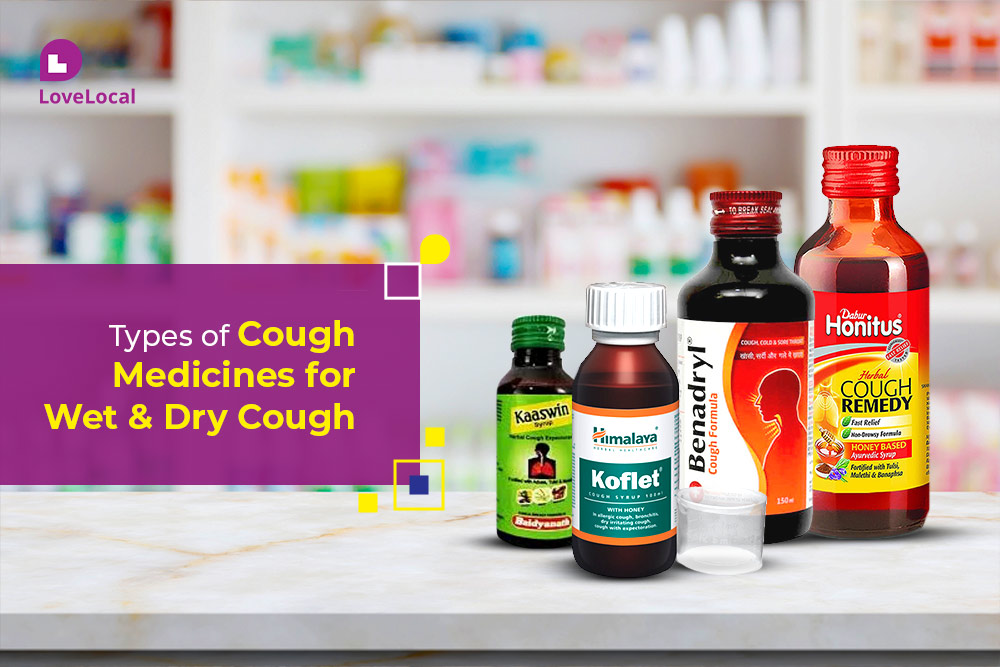To treat a cough, most of us use an over-the-counter cough syrup or apply a menthol-based ointment to our chest. It is crucial to comprehend how these medications work before attempting this type of self-care. There are various medicines used to treat various types of coughs for wet and dry cough, so you must determine which one is best suited to your situation. A wet or productive cough, for example, requires different treatment than a dry cough.
Before we proceed, we need to know more about coughs.
- What is Cough?
Coughing is your reaction of the body to something irritating your throat or nasal passages. An irritant stimulates nerves, which send signals to your brain. The brain then instructs the muscles in your chest and abdomen to push air out of your lungs in order to drive the irritant out. Coughing on instance is common and healthy.
Coughs are classified as productive or nonproductive. A productive cough or wet cough excretes phlegm or mucus from the lungs. A dry cough, also recognized as a nonproductive cough, produces no phlegm or mucus.
- Dry or Non Productive Cough
Many situations — from allergies to stomach issues — can cause a dry cough. There is no known explanation in some cases. A persistent dry cough, irrespective of the cause, can have a significant impact on your daily life, especially if it is far worse at night.
- Wet or Productive Cough
A productive cough, also known as a wet cough, would be any cough that generates mucus (phlegm). It may feel as if something is jammed in your chest or back of your throat. Mucus may enter your mouth as a consequence of a wet cough. A wet cough means your body is producing more mucus than usual.
Continue reading to learn more about the different types of cough medicines available over the counter or by prescription.
- Cough Suppressants
These are also known as antitussives and are typically used to treat a dry cough. They work by repressing the part of your brain that causes you to cough. These medications relieve coughing but do not treat the root of coughing or hasten recovery. These medications should not be used to treat cough caused by smoking or long-term pulmonary problems. Dextromethorphan is a popular antitussive.
- Decongestants
These are used to treat a runny nose and cough caused by mucus spurting back into the throat. They can only be used to clear your breathing passages if your nose is clogged or your cough is caused by a post-nasal drip in order to sleep comfortably. Phenylephrine is a common ingredient to look for in decongestants.
- Antihistamines
These are anti-allergic medications that only work if your cough is caused by allergies that impact your nose and throat. These work by preventing the release of histamines, which our bodies produce in response to allergens. Antihistamines can only help with allergic reactions such as coughing, watery eyes, and sneezing. Chlorpheniramine is a popular component to look for in antihistamine-based cough syrup.
- Expectorants and Mucolytics
These are frequently prescribed for an effective or wet cough. They work by clearing the mucus in the respiratory system, making it simpler to cough up and clear the breathing passages. Guaifenesin is a primary ingredient to look for in cough syrup.
- Combination Medicines
Some cough syrups contain steroid inhalers as well as nasal sprays and antihistamines. A pain reliever is sometimes included. This type of conjunction is commonly used to treat side effects such as cold congestion, coughing, and body aches. However, because these medications are a fusion of anti-cough formulations, using them may result in the administration of unnecessary prescribed medication.
- Topical Applications
To help ease cough and cold illnesses, ointments containing camphor or menthol are frequently applied to the chest or back. However, there is insufficient evidence to back up the usefulness of these treatments.
- Best Cough Syrups for Dry Coughs in India
Here is a list of the best cough syrups for dry coughs, to help you have a more clear idea about it.
- Baidyanath Kaaswin Herbal Cough Syrup
- Baidyanath Kasamrit Cough Syrup 200 ML.
- Bibo Cough Syrup – Premium Ayurveda – 20+ Herbs and Honey – 100ML Bottle.
- Dabur Bronchid Cough Syrup Bottle OF 200 ML.
- Dabur Honitus Cough Syrup Bottle
- Dabur Honitus Adulsa Cough Syrup
- Kofol Cough Syrup Bottle – 100 ML.
- Kofol SF Cough Syrup Bottle – 100 ML.
- Himalaya Koflet Syrup– 100ML.
- Dabur Honitus Sugar Free Cough Syrup – 100 ML.
All of these cough syrups are listed as the best cough syrups for dry coughs in India. All of them are prescribed as cough syrups for adults. Although, the application and dosage may vary from one product to another.
- Best Cough Syrups for Wet Coughs in India
Here is a list of the best cough syrups for wet coughs, to help you have a more clear idea about it.
- Dabur Honitus Syrup
- Charak Pharma Kofol SF Cough Syrup.
- Vaddmaan Zecof Cough Syrup
- Maharishi Ayurveda Kasni Cough Syrup.
- Multani Kuka Cough Syrup.
- Himalaya Septilin Cough Syrup.
- Green Cure Bronchicure Herbal Lung Care Cough Syrup.
- Kofton Ayurvedic/Herbal Cough Syrup.
- Ascoryl LS Wet Cough Syrup.
- Benadryl Cough Syrup.
- Prospan Wet Cough Syrup
All of these cough syrups are listed as the best cough syrups for wet coughs in India. All of them are prescribed as cough syrups for adults. Although, the application and dosage may vary from one product to another.
Conclusion
As you have read in the article, there are different types of cough syrups for all the types of coughing issues you face. Although, If the over-the-counter prescription drugs could not provide significant relief, consult your doctor for a prescription dose. Inform the doctor about any current chronic illnesses or medications you are taking, particularly antidepressants, blood pressure medications, or any other long-term medications. If you undergo any severe side effects, contact your doctor right away.
Shop from your nearest pharmacy available on LoveLocal



